Food Corporation Of India Mock Test- 7 - Government Jobs MCQ
30 Questions MCQ Test Food Corporation of India Mock Test Series 2024 - Food Corporation Of India Mock Test- 7
In the question given below, there are five statements marked A-E. All the statements except one belong to the same context. Find the odd one out and mark the correct answer from the given options.
A. The European Union has allocated an additional 1 million euros in emergency aid for flood-devastated Kerala, an EU delegation to India said on Tuesday.
B. The EU assistance will complement the national response and reach the most vulnerable communities whose livelihood, homes and belongings have been swept away by torrential rains
C. The Kerala State Government is launching a resource mobilisation drive across the world to fund the post-flood relief, rehabilitation and reconstruction programme.
D. According to a statement, this comes on top of the initial assistance of 190,000 euros announced last month and channelled through the Indian Red Cross.
E. This additional contribution is a gesture of solidarity coming from European citizens who stand by the Indian families affected by the dreadful blow
B. The EU assistance will complement the national response and reach the most vulnerable communities whose livelihood, homes and belongings have been swept away by torrential rains
C. The Kerala State Government is launching a resource mobilisation drive across the world to fund the post-flood relief, rehabilitation and reconstruction programme.
D. According to a statement, this comes on top of the initial assistance of 190,000 euros announced last month and channelled through the Indian Red Cross.
E. This additional contribution is a gesture of solidarity coming from European citizens who stand by the Indian families affected by the dreadful blow
Below a statement(s) has been divided into 5 parts. The one in the underline is the fixed part in which no changes can be made. Among other parts (A), (B), (C) and (D), find the erroneous part(s). If the statement has no error, mark the 5th option (No Error).
Q. Only those who have (A)/ the patience to do (B)/ simple things perfectly, ever (C)/ acquires the skill to (D)/ do difficult things easily.
| 1 Crore+ students have signed up on EduRev. Have you? Download the App |
Below a statement(s) has been divided into 5 parts. The one in the underline is the fixed part in which no changes can be made. Among other parts (A), (B), (C) and (D), find the erroneous part(s). If the statement has no error, mark the 5th option (No Error).
Q. Ellen Malos, in her (A)/ introduction to (B)/ "The Politics of Housework", / provide a summary (C)/ of the debates. (D)
Choose the correct meaning of the proverb/idiom.
A burnt child dreads the fire
Choose the correct meaning of the proverb/idiom.
Head and shoulders above
In the following question, two columns are given, containing three phrases each. A phrase from the first column may or may not connect with a phrase from the second column to make a grammatically and contextually correct sentence. There are five options, four of which display the sequence(s) in which the phrases can be joined to form a correct sentence. If none of the phrases make a correct sentence, mark ‘None of these’ as your answer.
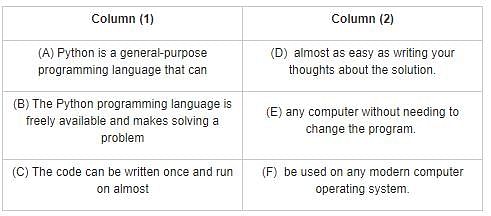
In the following question, two columns are given, containing three phrases each. A phrase from the first column may or may not connect with a phrase from the second column to make a grammatically and contextually correct sentence. There are five options, four of which display the sequence(s) in which the phrases can be joined to form a correct sentence. If none of the phrases make a correct sentence, mark ‘None of these’ as your answer.
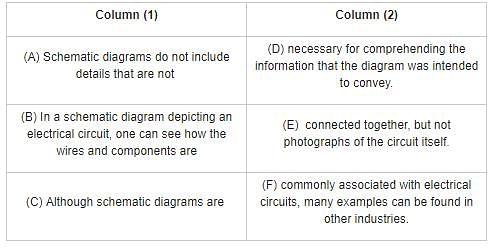
In the following question, two columns are given, containing three phrases each. A phrase from the first column may or may not connect with a phrase from the second column to make a grammatically and contextually correct sentence. There are five options, four of which display the sequence(s) in which the phrases can be joined to form a correct sentence. If none of the phrases make a correct sentence, mark ‘None of these’ as your answer.
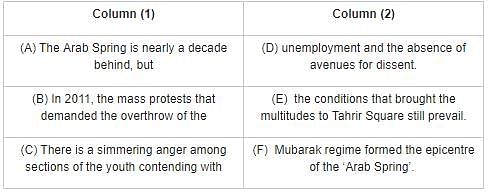
In the following question, two columns are given, containing three phrases each. A phrase from the first column may or may not connect with a phrase from the second column to make a grammatically and contextually correct sentence. There are five options, four of which display the sequence(s) in which the phrases can be joined to form a correct sentence. If none of the phrases make a correct sentence, mark ‘None of these’ as your answer.
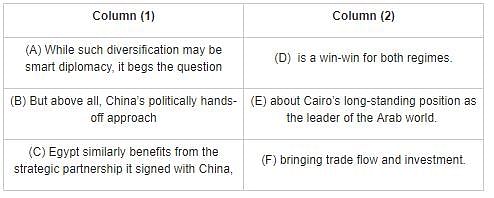
In the following question, two columns are given, containing three phrases each. A phrase from the first column may or may not connect with a phrase from the second column to make a grammatically and contextually correct sentence. There are five options, four of which display the sequence(s) in which the phrases can be joined to form a correct sentence. If none of the phrases make a correct sentence, mark ‘None of these’ as your answer.
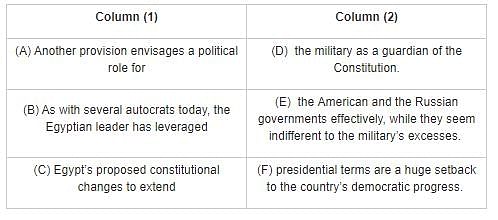
Choose an appropriate phrase from the options to suitably fill the blank in the sentence below so that the sentence makes sense, both grammatically and contextually.
Tom applied for a promotion twice this year, but he was _______ both times.
Choose an appropriate word from the options to suitably fill the blank in the sentence below so that the sentence makes sense, both grammatically and contextually.
She _______ the reason for getting fired from her last babysitting job.
In the following question, choose the word OPPOSITE in meaning to the given word.
Postpone
In the following question, choose the word SAME in meaning to the given word.
Viable
In the following question, choose the word SAME in meaning to the given word.
Gallant
In the following question, choose the word SAME in meaning to the given word.
Exonerate
In the following question, choose the word SAME in meaning to the given word.
Ubiquitous
In the following passage, some of the words have been left out. Read the passage carefully and select the correct answer for the given blank out of the four alternatives.
There’s no end to the benefits of donating blood for those who need it. According to the American Red Cross, one__________can save as many as three lives, and someone in the United States needs blood every two seconds. It turns out that donating blood doesn’t just benefit recipients. There are health benefits for donors, too, on top of the _______that come from helping others. There’s no end to the benefits of donating blood for those who need it. Donating blood has benefits for your emotional and _________ health. Blood donation may lower the risk of heart _________ and heart attack. This is because it reduces the blood’s _______.
Q. one ________can save
In the following passage, some of the words have been left out. Read the passage carefully and select the correct answer for the given blank out of the four alternatives.
There’s no end to the benefits of donating blood for those who need it. According to the American Red Cross, one__________can save as many as three lives, and someone in the United States needs blood every two seconds. It turns out that donating blood doesn’t just benefit recipients. There are health benefits for donors, too, on top of the _______that come from helping others. There’s no end to the benefits of donating blood for those who need it. Donating blood has benefits for your emotional and _________ health. Blood donation may lower the risk of heart _________ and heart attack. This is because it reduces the blood’s _______.
Q. on top of the _____that come from
In the following passage, some of the words have been left out. Read the passage carefully and select the correct answer for the given blank out of the four alternatives.
There’s no end to the benefits of donating blood for those who need it. According to the American Red Cross, one__________can save as many as three lives, and someone in the United States needs blood every two seconds. It turns out that donating blood doesn’t just benefit recipients. There are health benefits for donors, too, on top of the _______that come from helping others. There’s no end to the benefits of donating blood for those who need it. Donating blood has benefits for your emotional and _________ health. Blood donation may lower the risk of heart _________ and heart attack. This is because it reduces the blood’s _______.
Q. for your emotional and _______health
In the following passage, some of the words have been left out. Read the passage carefully and select the correct answer for the given blank out of the four alternatives.
There’s no end to the benefits of donating blood for those who need it. According to the American Red Cross, one__________can save as many as three lives, and someone in the United States needs blood every two seconds. It turns out that donating blood doesn’t just benefit recipients. There are health benefits for donors, too, on top of the _______that come from helping others. There’s no end to the benefits of donating blood for those who need it. Donating blood has benefits for your emotional and _________ health. Blood donation may lower the risk of heart _________ and heart attack. This is because it reduces the blood’s _______.
Q. risk of heart ________and heart attack
In the following passage, some of the words have been left out. Read the passage carefully and select the correct answer for the given blank out of the four alternatives.
There’s no end to the benefits of donating blood for those who need it. According to the American Red Cross, one__________can save as many as three lives, and someone in the United States needs blood every two seconds. It turns out that donating blood doesn’t just benefit recipients. There are health benefits for donors, too, on top of the _______that come from helping others. There’s no end to the benefits of donating blood for those who need it. Donating blood has benefits for your emotional and _________ health. Blood donation may lower the risk of heart _________ and heart attack. This is because it reduces the blood’s _______.
Q. it reduces the blood's ________
Read the given passage carefully and select the best answer to each question out of the given alternatives. Some words have been highlighted for your attention.
Ever since humans developed the ability to transfer their thoughts onto paper, the spread of human knowledge has continually taken big steps toward progress. From Thales of Miletus (the first known philosopher) all the way to Paulo Coelho’s The Alchemist, humans have successfully passed on their experiences through books. No one can argue the importance of the Gutenberg printing press, which fueled the desire to acquire knowledge during the Renaissance and Enlightenment periods in Europe.
Throughout history, books and knowledge have been treated as conjoined twins—one could never exist without the other. However, the advent of modern technology has dramatically changed the way we perceive knowledge. The fine line between information and knowledge is essentially fading away, and because of that, the culture of book reading is also facing a potential degeneration.
Nevertheless, if you are one of the few whose love of printed books has not yet been routed, there is plenty of solace for you yet, in this tech-savvy age. Libraries firmly stand their ground and are home to some of the most influential and ancient printed books—writings that have helped shape human thought and history over the ages.
One such dedicated library that can still be visited is at Trinity College in Dublin. Catering to the knowledge-hungry for over three centuries, this stunning library holds over 200,000 books, ranging from popular classics to all known genres of printed books. Moreover, a large collection of free-of-charge materials published in the Republic of Ireland is also received by the Trinity College Library on a regular basis.
Q. Who wrote 'The Alchemist'?
Read the given passage carefully and select the best answer to each question out of the given alternatives. Some words have been highlighted for your attention.
Ever since humans developed the ability to transfer their thoughts onto paper, the spread of human knowledge has continually taken big steps toward progress. From Thales of Miletus (the first known philosopher) all the way to Paulo Coelho’s The Alchemist, humans have successfully passed on their experiences through books. No one can argue the importance of the Gutenberg printing press, which fueled the desire to acquire knowledge during the Renaissance and Enlightenment periods in Europe.
Throughout history, books and knowledge have been treated as conjoined twins—one could never exist without the other. However, the advent of modern technology has dramatically changed the way we perceive knowledge. The fine line between information and knowledge is essentially fading away, and because of that, the culture of book reading is also facing a potential degeneration.
Nevertheless, if you are one of the few whose love of printed books has not yet been routed, there is plenty of solace for you yet, in this tech-savvy age. Libraries firmly stand their ground and are home to some of the most influential and ancient printed books—writings that have helped shape human thought and history over the ages.
One such dedicated library that can still be visited is at Trinity College in Dublin. Catering to the knowledge-hungry for over three centuries, this stunning library holds over 200,000 books, ranging from popular classics to all known genres of printed books. Moreover, a large collection of free-of-charge materials published in the Republic of Ireland is also received by the Trinity College Library on a regular basis.
Q. Who was the first known philosopher?
Read the given passage carefully and select the best answer to each question out of the given alternatives. Some words have been highlighted for your attention.
Ever since humans developed the ability to transfer their thoughts onto paper, the spread of human knowledge has continually taken big steps toward progress. From Thales of Miletus (the first known philosopher) all the way to Paulo Coelho’s The Alchemist, humans have successfully passed on their experiences through books. No one can argue the importance of the Gutenberg printing press, which fueled the desire to acquire knowledge during the Renaissance and Enlightenment periods in Europe.
Throughout history, books and knowledge have been treated as conjoined twins—one could never exist without the other. However, the advent of modern technology has dramatically changed the way we perceive knowledge. The fine line between information and knowledge is essentially fading away, and because of that, the culture of book reading is also facing a potential degeneration.
Nevertheless, if you are one of the few whose love of printed books has not yet been routed, there is plenty of solace for you yet, in this tech-savvy age. Libraries firmly stand their ground and are home to some of the most influential and ancient printed books—writings that have helped shape human thought and history over the ages.
One such dedicated library that can still be visited is at Trinity College in Dublin. Catering to the knowledge-hungry for over three centuries, this stunning library holds over 200,000 books, ranging from popular classics to all known genres of printed books. Moreover, a large collection of free-of-charge materials published in the Republic of Ireland is also received by the Trinity College Library on a regular basis.
Q. What have been treated as conjoined twins?
Read the given passage carefully and select the best answer to each question out of the given alternatives. Some words have been highlighted for your attention.
Ever since humans developed the ability to transfer their thoughts onto paper, the spread of human knowledge has continually taken big steps toward progress. From Thales of Miletus (the first known philosopher) all the way to Paulo Coelho’s The Alchemist, humans have successfully passed on their experiences through books. No one can argue the importance of the Gutenberg printing press, which fueled the desire to acquire knowledge during the Renaissance and Enlightenment periods in Europe.
Throughout history, books and knowledge have been treated as conjoined twins—one could never exist without the other. However, the advent of modern technology has dramatically changed the way we perceive knowledge. The fine line between information and knowledge is essentially fading away, and because of that, the culture of book reading is also facing a potential degeneration.
Nevertheless, if you are one of the few whose love of printed books has not yet been routed, there is plenty of solace for you yet, in this tech-savvy age. Libraries firmly stand their ground and are home to some of the most influential and ancient printed books—writings that have helped shape human thought and history over the ages.
One such dedicated library that can still be visited is at Trinity College in Dublin. Catering to the knowledge-hungry for over three centuries, this stunning library holds over 200,000 books, ranging from popular classics to all known genres of printed books. Moreover, a large collection of free-of-charge materials published in the Republic of Ireland is also received by the Trinity College Library on a regular basis.
Q. Which word is the most similar in meaning to 'solace' as used in the given passage?
Read the given passage carefully and select the best answer to each question out of the given alternatives. Some words have been highlighted for your attention.
Ever since humans developed the ability to transfer their thoughts onto paper, the spread of human knowledge has continually taken big steps toward progress. From Thales of Miletus (the first known philosopher) all the way to Paulo Coelho’s The Alchemist, humans have successfully passed on their experiences through books. No one can argue the importance of the Gutenberg printing press, which fueled the desire to acquire knowledge during the Renaissance and Enlightenment periods in Europe.
Throughout history, books and knowledge have been treated as conjoined twins—one could never exist without the other. However, the advent of modern technology has dramatically changed the way we perceive knowledge. The fine line between information and knowledge is essentially fading away, and because of that, the culture of book reading is also facing a potential degeneration.
Nevertheless, if you are one of the few whose love of printed books has not yet been routed, there is plenty of solace for you yet, in this tech-savvy age. Libraries firmly stand their ground and are home to some of the most influential and ancient printed books—writings that have helped shape human thought and history over the ages.
One such dedicated library that can still be visited is at Trinity College in Dublin. Catering to the knowledge-hungry for over three centuries, this stunning library holds over 200,000 books, ranging from popular classics to all known genres of printed books. Moreover, a large collection of free-of-charge materials published in the Republic of Ireland is also received by the Trinity College Library on a regular basis.
Q. Which word is the most opposite in meaning to 'ability' as used in the given passage?
Choose the statement from the given options that is grammatically and contextually correct.
Choose the statement from the given options that is grammatically and contextually correct.
Replace the underline words as and if required. If no replacement is required, then choose the option that indicates 'no replacement'.
In the ensuing silence he repaired to the buffet and downed a glass of wine.
I. ensuing - installing
II. repaired- retreated
III. downed - drowned












